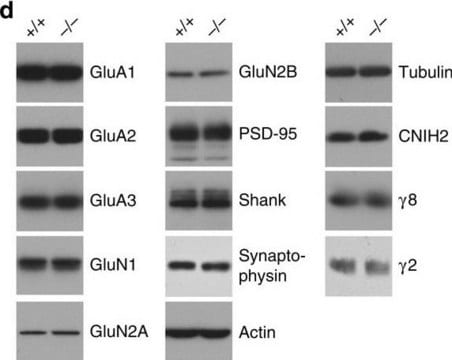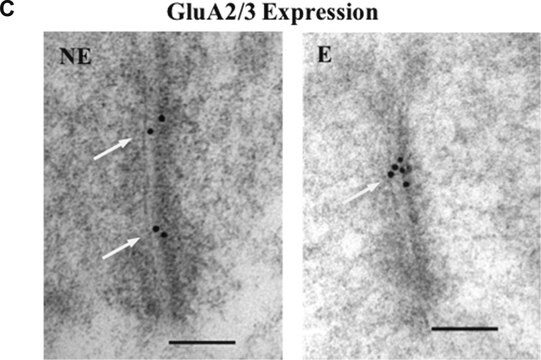04-855
Anti-GluR1 Antibody, clone C3T, rabbit monoclonal
culture supernatant, clone C3T, Upstate®
Synonym(s):
Anti-GluA1, Anti-GluR-1, Anti-GluR-A, Anti-GluR-K1, Anti-GluR1
About This Item
IP
WB
immunoprecipitation (IP): suitable
western blot: suitable
Recommended Products
biological source
rabbit
Quality Level
antibody form
culture supernatant
antibody product type
primary antibodies
clone
C3T, monoclonal
species reactivity
human, chimpanzee, rat, mouse
manufacturer/tradename
Upstate®
technique(s)
immunohistochemistry: suitable
immunoprecipitation (IP): suitable
western blot: suitable
isotype
IgG
NCBI accession no.
UniProt accession no.
shipped in
dry ice
target post-translational modification
unmodified
Gene Information
human ... GRIA1(2890)
General description
Specificity
Immunogen
Application
Immunohistochemistry: A previous lot of this antibody has been shown to detect GluR1 in human, mouse and rat tissues.
Neuroscience
Neurotransmitters & Receptors
Quality
Western Blotting Analysis (WB): A 1:5,000-1:10,000 dilution of this lot detected GluR1 in rat brain microsomal preparation (Catalog # 12-144).
Target description
Linkage
Physical form
Storage and Stability
Analysis Note
Routinely evaluated by immunoblot on rat brain microsomal preparation (12-144)
Legal Information
Disclaimer
Not finding the right product?
Try our Product Selector Tool.
recommended
Storage Class Code
10 - Combustible liquids
WGK
WGK 2
Certificates of Analysis (COA)
Search for Certificates of Analysis (COA) by entering the products Lot/Batch Number. Lot and Batch Numbers can be found on a product’s label following the words ‘Lot’ or ‘Batch’.
Already Own This Product?
Find documentation for the products that you have recently purchased in the Document Library.
Our team of scientists has experience in all areas of research including Life Science, Material Science, Chemical Synthesis, Chromatography, Analytical and many others.
Contact Technical Service








